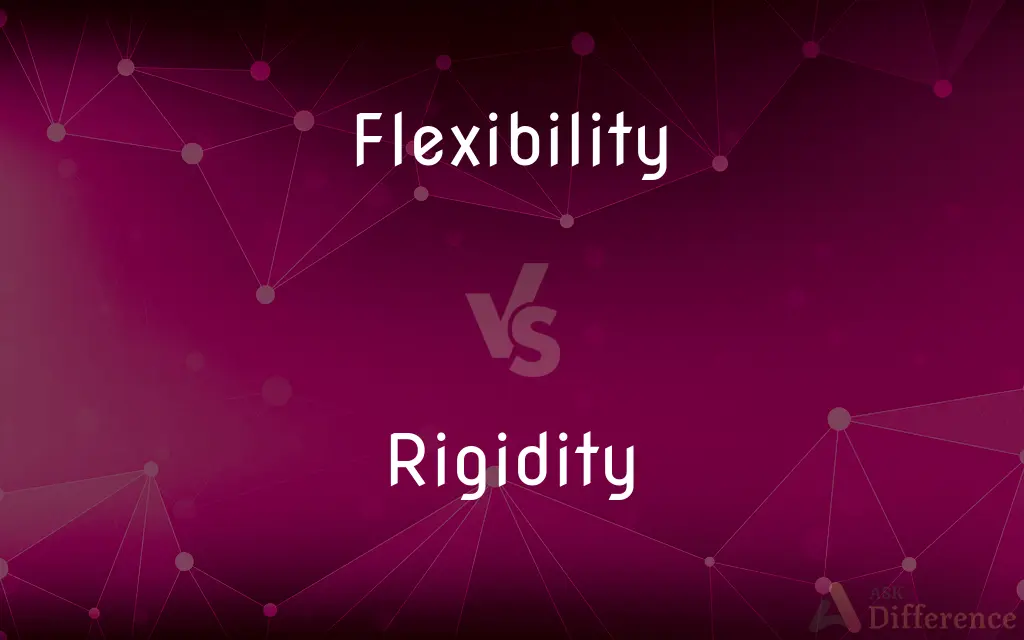Flexibility vs. Rigidity — What's the Difference?
By Tayyaba Rehman & Fiza Rafique — Updated on April 17, 2024
Flexibility involves adaptability and tolerance for change, while rigidity denotes strict adherence to rules or standards without flexibility.

Difference Between Flexibility and Rigidity
Table of Contents
ADVERTISEMENT
Key Differences
Flexibility allows for adjustments and adaptations in response to changing conditions or new information, whereas rigidity involves sticking to predetermined rules or plans despite potentially new or evolving circumstances.
In personal behavior, flexibility is often associated with openness and the ability to compromise, while rigidity can be seen as stubbornness or an unwillingness to change one's viewpoints or actions.
In materials science, flexibility refers to the ability of a material to bend without breaking, on the other hand, rigidity describes materials that resist deformation and maintain their shape under stress.
In the workplace, flexibility can lead to innovative problem-solving and increased adaptability to market changes, whereas rigidity might result in adherence to outdated processes or technologies, potentially hindering progress.
In decision-making, flexibility allows leaders to alter strategies based on feedback and results, whereas rigidity might lead to sticking with a failing plan due to commitment to a previously set course.
ADVERTISEMENT
Comparison Chart
Definition
Ability to adapt to new, changing, or challenging situations
Strict adherence to specific rules or standards
Personality Trait
Open to change and new ideas
Often resistant to change and new ideas
Material Property
Can bend easily without breaking
Maintains shape and resists deformation
Workplace Approach
Encourages innovation and adaptability
Follows established protocols strictly
Decision-Making
Adapts strategies based on new information
Sticks to initial plans regardless of new inputs
Compare with Definitions
Flexibility
The capacity of materials or structures to bend without breaking.
The flexibility of the new composite materials made them ideal for aerospace engineering.
Rigidity
The property of being physically hard and inflexible.
The rigidity of the frozen lake made it safe for ice skating.
Flexibility
Willingness to adjust methods or viewpoints.
The manager's flexibility in strategy led to the project's success.
Rigidity
Inflexibility in thinking or decision-making.
His rigidity on the budget issues caused a delay in the project approval.
Flexibility
Ease of movement or limberness in physical fitness.
Yoga significantly improved her flexibility and overall posture.
Rigidity
The unyielding or uncompromising nature of attitudes.
Her rigidity in negotiations made her a tough opponent.
Flexibility
Versatility in functionality or utility.
The software’s flexibility makes it popular across various industries.
Rigidity
Strict adherence to specific rules or standards without exception.
The rigidity of the guidelines ensured consistent quality in production.
Flexibility
The ability to adapt or change according to different circumstances.
His flexibility allowed him to work from home or the office interchangeably.
Rigidity
Lack of flexibility; stiffness in materials or design.
The rigidity of the building’s frame helps it withstand earthquakes.
Flexibility
Capable of being bent or flexed; pliable
A flexible hose.
Rigidity
Inability to be to bent or be forced out of shape
The tough substance that gives plants their rigidity
Flexibility
Readily bending or twisting the body without injury
You can play soccer much better if you're flexible.
Rigidity
Inability to be changed or adapted
The rigidity of the school system
Flexibility
Able to change to cope with variable circumstances
"a flexible and quietly competent administrator" (Jerome Karabel).
Rigidity
The quality or state of being rigid.
Flexibility
Capable of being changed or adjusted to meet particular or varied needs
A job with flexible hours.
A flexible definition of normality.
Rigidity
An instance of being rigid.
Flexibility
The quality of being flexible; suppleness; pliability.
Rigidity
The quality or state of being rigid; lack of pliability; the quality of resisting change of physical shape
Flexibility
The quality of having options.
I had some flexibility in terms of whether to stay in a hotel or in a bed-and-breakfast.
Rigidity
The amount of resistance with which a body opposes change of form.
Flexibility
The state or quality of being flexible; flexibleness; pliancy; pliability; as, the flexibility of strips of hemlock, hickory, whalebone or metal, or of rays of light.
All the flexibility of a veteran courtier.
Rigidity
Stiffness of appearance or manner; want of ease or elegance.
Flexibility
The property of being flexible
Rigidity
(economics) stickiness (of prices/wages etc.). Describing the tendency of prices and money wages to adjust to changes in the economy with a certain delay.
Flexibility
The quality of being adaptable or variable;
He enjoyed the flexibility of his working arrangement
Rigidity
The quality or state of being rigid; want of pliability; the quality of resisting change of form; the amount of resistance with which a body opposes change of form; - opposed to flexibility, ductility, malleability, and softness.
Flexibility
The trait of being easily persuaded
Rigidity
Stiffness of appearance or manner; want of ease or elegance.
Rigidity
Severity; rigor.
Rigidity
The physical property of being stiff and resisting bending
Rigidity
The quality of being rigid and rigorously severe
Common Curiosities
What is flexibility?
Flexibility refers to the ability to adapt or be willing to change as necessary.
Can rigidity be beneficial?
Yes, rigidity can provide stability and predictability in environments where consistent results are crucial.
What is rigidity?
Rigidity is the strict adherence to set rules or standards without flexibility.
How does flexibility influence creativity?
Flexibility often encourages creative thinking by allowing exploration of various possibilities and solutions.
What are the risks of being too flexible?
Excessive flexibility might lead to inconsistency and difficulty in maintaining focus or direction.
How does rigidity impact workplace efficiency?
While rigidity can streamline processes through consistent practices, it may also hinder adaptability and responsiveness to changes.
How does flexibility affect personal relationships?
Flexibility can improve relationships by allowing adjustments and accommodations for individual needs.
What are the consequences of excessive rigidity?
Excessive rigidity can lead to inefficiency, employee dissatisfaction, and inability to adapt to new challenges.
Why is flexibility important in management?
Flexibility in management helps adapt strategies to changing market conditions or team dynamics.
How does flexibility affect decision-making?
It enables more dynamic and responsive decision-making processes, potentially leading to better outcomes.
How can an individual become more flexible?
Individuals can become more flexible by practicing open-mindedness and learning from diverse perspectives.
How can flexibility be integrated into traditional systems?
Traditional systems can incorporate flexibility through feedback mechanisms and adaptive protocols.
In which fields is rigidity particularly important?
Fields like law, accounting, and engineering often require a high degree of rigidity to ensure accuracy and compliance.
Is rigidity always negative?
Not necessarily, as it can be essential for ensuring safety and compliance in critical environments.
Share Your Discovery

Previous Comparison
Forget vs. Leave
Next Comparison
Scaringly vs. ScarilyAuthor Spotlight
Written by
Tayyaba RehmanTayyaba Rehman is a distinguished writer, currently serving as a primary contributor to askdifference.com. As a researcher in semantics and etymology, Tayyaba's passion for the complexity of languages and their distinctions has found a perfect home on the platform. Tayyaba delves into the intricacies of language, distinguishing between commonly confused words and phrases, thereby providing clarity for readers worldwide.
Co-written by
Fiza RafiqueFiza Rafique is a skilled content writer at AskDifference.com, where she meticulously refines and enhances written pieces. Drawing from her vast editorial expertise, Fiza ensures clarity, accuracy, and precision in every article. Passionate about language, she continually seeks to elevate the quality of content for readers worldwide.















































